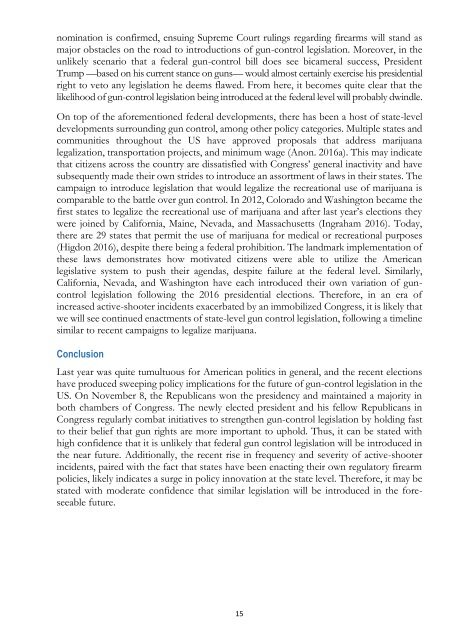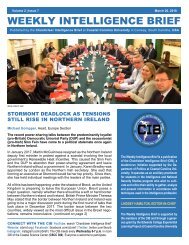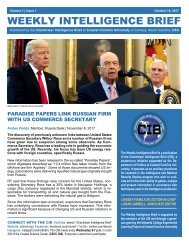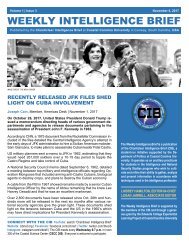The Intelligence Review | volume 1 | issue 2 |
This volume is the product of a collaboration between the European Intelligence Academy (EIA) and the Chanticleer Intelligence Brief (CIB), a student-run initiative supported by the Department of Politics at Coastal Carolina University in Conway, South Carolina, United States. Eleven CIB analysts tackle some of the most pressing and timely questions confronting intelligence observers today. Topics include the gun control debate in the United States, Russia’s involvement in the Syrian Civil War, the future of Kurdish nationalism, and the internal Palestinian dispute between Hamas and Fatah. Papers in this volume also examine the current state of Islamist extremism, and extrapolate on its future prospects in the Middle East, West Africa, the Lake Chad region, as well as in Southeast and Central Asia. CIB analysts propose carefully crafted and informed forecasts that outline future developments in some of the world's most unpredictable hot spots.
This volume is the product of a collaboration between the European Intelligence Academy (EIA) and the Chanticleer Intelligence Brief (CIB), a student-run initiative supported by the Department of Politics at Coastal Carolina University in Conway, South Carolina, United States. Eleven CIB analysts tackle some of the most pressing and timely questions confronting intelligence observers today. Topics include the gun control debate in the United States, Russia’s involvement in the Syrian Civil War, the future of Kurdish nationalism, and the internal Palestinian dispute between Hamas and Fatah. Papers in this volume also examine the current state of Islamist extremism, and extrapolate on its future prospects in the Middle East, West Africa, the Lake Chad region, as well as in Southeast and Central Asia. CIB analysts propose carefully crafted and informed forecasts that outline future developments in some of the world's most unpredictable hot spots.
- No tags were found...
Create successful ePaper yourself
Turn your PDF publications into a flip-book with our unique Google optimized e-Paper software.
nomination is confirmed, ensuing Supreme Court rulings regarding firearms will stand as<br />
major obstacles on the road to introductions of gun-control legislation. Moreover, in the<br />
unlikely scenario that a federal gun-control bill does see bicameral success, President<br />
Trump —based on his current stance on guns— would almost certainly exercise his presidential<br />
right to veto any legislation he deems flawed. From here, it becomes quite clear that the<br />
likelihood of gun-control legislation being introduced at the federal level will probably dwindle.<br />
On top of the aforementioned federal developments, there has been a host of state-level<br />
developments surrounding gun control, among other policy categories. Multiple states and<br />
communities throughout the US have approved proposals that address marijuana<br />
legalization, transportation projects, and minimum wage (Anon. 2016a). This may indicate<br />
that citizens across the country are dissatisfied with Congress’ general inactivity and have<br />
subsequently made their own strides to introduce an assortment of laws in their states. <strong>The</strong><br />
campaign to introduce legislation that would legalize the recreational use of marijuana is<br />
comparable to the battle over gun control. In 2012, Colorado and Washington became the<br />
first states to legalize the recreational use of marijuana and after last year’s elections they<br />
were joined by California, Maine, Nevada, and Massachusetts (Ingraham 2016). Today,<br />
there are 29 states that permit the use of marijuana for medical or recreational purposes<br />
(Higdon 2016), despite there being a federal prohibition. <strong>The</strong> landmark implementation of<br />
these laws demonstrates how motivated citizens were able to utilize the American<br />
legislative system to push their agendas, despite failure at the federal level. Similarly,<br />
California, Nevada, and Washington have each introduced their own variation of guncontrol<br />
legislation following the 2016 presidential elections. <strong>The</strong>refore, in an era of<br />
increased active-shooter incidents exacerbated by an immobilized Congress, it is likely that<br />
we will see continued enactments of state-level gun control legislation, following a timeline<br />
similar to recent campaigns to legalize marijuana.<br />
Conclusion<br />
Last year was quite tumultuous for American politics in general, and the recent elections<br />
have produced sweeping policy implications for the future of gun-control legislation in the<br />
US. On November 8, the Republicans won the presidency and maintained a majority in<br />
both chambers of Congress. <strong>The</strong> newly elected president and his fellow Republicans in<br />
Congress regularly combat initiatives to strengthen gun-control legislation by holding fast<br />
to their belief that gun rights are more important to uphold. Thus, it can be stated with<br />
high confidence that it is unlikely that federal gun control legislation will be introduced in<br />
the near future. Additionally, the recent rise in frequency and severity of active-shooter<br />
incidents, paired with the fact that states have been enacting their own regulatory firearm<br />
policies, likely indicates a surge in policy innovation at the state level. <strong>The</strong>refore, it may be<br />
stated with moderate confidence that similar legislation will be introduced in the foreseeable<br />
future.<br />
15


















